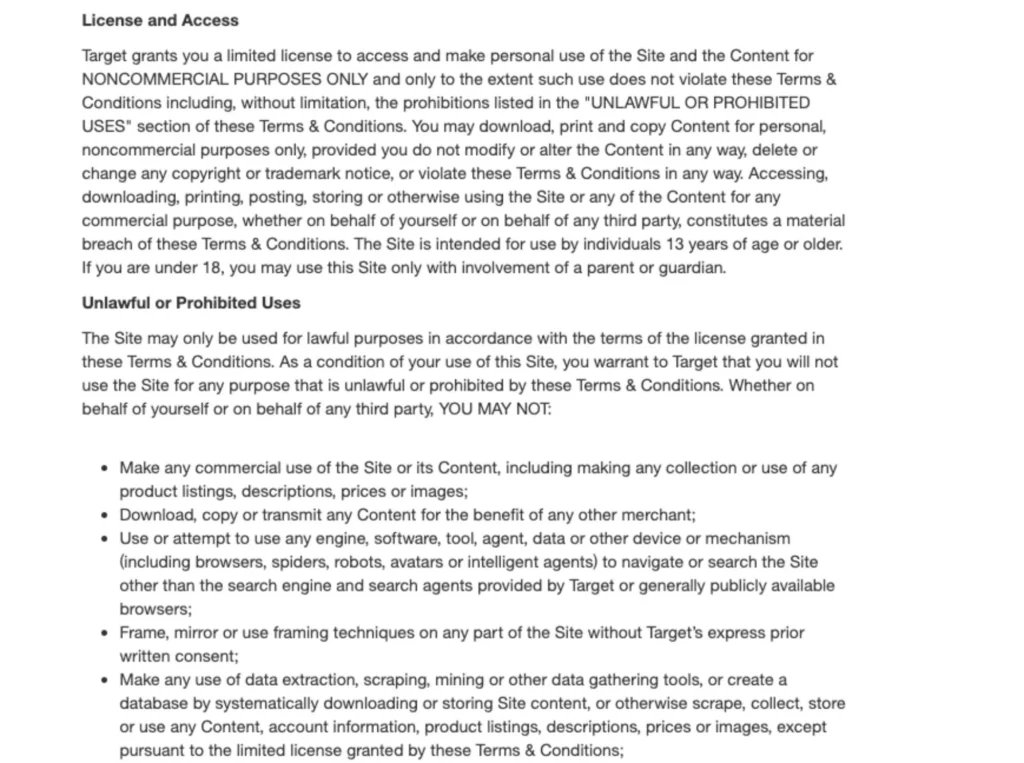In today’s world, running a business usually entails maintaining a website for said business. It’s essential to protect yourself, as well as your business’s reputation, from unwanted activity linked to this website, such as fraud, chargebacks, and a host of other nefarious activities. One of the best ways to provide legal protection to your business is a terms of use agreement outlining your website’s conditions.
If you shop online, you’ve likely accepted terms of use from an online retailer. While a terms of use agreement isn’t necessarily required, any responsible business owner values the legal protection it affords. However, if you’re new to eCommerce, you may be wondering, “What is a terms of use agreement, and why is it so important?”
This guide details everything you need to know about terms of use. Afterward, you’ll have a full understanding of this necessary tool. You’ll never again wonder what a terms of use is and why it’s so important.
What Are Terms and Conditions?

Terms and conditions (another phrase for terms of use) is a list of conditions displayed on a website outlining a usage agreement. It’s an agreement between a website owner and a website user, which details restrictions associated with using that website.
In many cases, a business hosts its terms and conditions on its website footer. For online stores or websites requiring an account, the site may require users to approve terms and conditions prior to completing an order or creating an account.

Terms of use vs terms of service vs terms and conditions
If you’re new to these agreements, you may see what is essentially the same agreement described using various phrases. Terms of use, terms of service, and terms and conditions all describe the same agreement. These phrases are used interchangeably.

Terms of use vs privacy policy
On the other hand, terms of service and privacy policies are very different.
A privacy policy is a useful tool for declaring your website’s data use policy. If you’re collecting information on your website’s visitors, you must outline how you use this private information. Visitors may want to know if their information is available to third parties, etc. A privacy policy, however, does not outline what it expects of website visitors’ behavior.
Terms of service outlines conditions for the website owner and the website user. This agreement rarely focuses on privacy.

Is a terms of service agreement legally binding?
Yes, this agreement is legally binding. That said, you don’t need a lawyer to generate a legally binding agreement.
Why Does Your Website Need a Terms of Use Agreement?
If you don’t currently have an agreement, you may wonder if you really need one.
Yes. Terms of service agreements are essential for a variety of reasons. While there’s no requirement to have one, not having it exposes your business to undue elements of fraud and risk. Below details the benefits, as well as the avoided risks, of having terms and conditions.

1. Establish authority
Having terms and conditions on your website is, if nothing else, professional. It helps build trust with your website’s visitors and online shoppers. Experienced online shoppers understand the importance of these agreements, thus a lack thereof may seem suspicious.

2. Site abuse
If you want to avoid spam, bot usage, and other problems, a ban on this type of activity should be present in your agreement. For example, some clothing stores selling limited-release clothing ban bots in their agreements to prevent resellers from hoarding their stock. This allows them to ban shoppers who violate their rules.

3. Trademarks and private property
If you have a business with an online presence, you need to protect your logos, slogans, and other trademarked properties. Outlining your trademarks and private property in your agreement can protect your intellectual property from abuse.

4. Limits on liability
If you want to shield your business from large liability costs, it’s essential to have an agreement limiting liability. This can help you outline warranty issues, limits on liability for product malfunctions, and more.

5. Chargeback prevention
Lastly, your agreement can also protect your business from chargeback fraud. If a customer attempts a chargeback and provides a reason covered in your agreement, you can supply this documentation to their credit card processor. This agreement can be a powerful chargeback management tool, as not requiring customers to agree to your agreement exposes you to chargeback fraud.
Types of Terms of Use Agreements
There are a couple of ways to alert visitors about your website’s terms of use. This ranges from passively alerting them via browsewrap agreements to actively alerting them via clickwrap agreements.

Clickwrap agreements
Clickwrap agreements pop up when a user is browsing a website. Users must accept the agreement before continuing to use the site, thus requiring the user to actively accept the terms and conditions.

Browsewrap agreements
Browsewrap agreements do not require the user to actively agree. These agreements will usually be at the bottom of a website’s footer, with visitors having to click a hyperlink to see the details. This may cause issues in that users don’t actively agree to these terms and conditions.
What to Include in Your Terms of Use Agreement
If you want to protect your business with terms of service, it’s essential to incorporate a few core components. Below details clauses to include. Keep in mind these clauses will vary depending on the website. The below clauses are only a few examples of what you should include.
Clauses to include
- Governing Law: If your website operates in a specific jurisdiction, you may want to include a clause that states the governing law to which your agreement adheres.
- Usage Policy: If you want to avoid bots, spam, and other similar troublesome activities on your website, it’s essential to include a clause that prevents this type of use.
- Limitation of Liability: Limiting liability is essential. Make sure to highlight that you’re not responsible for errors in web content or for the content others post on your site. If you’re selling products, you may also want to include clauses to limit liability for product malfunctions.
- Copyright and Trademarks: Creating a fair use policy outlining your willingness, or lack thereof, to allow others to use your logos, slogans, and other intellectual properties is essential. Restricting the use can protect your business from copycats.
- Privacy Policy: As previously discussed, a privacy policy is separate from terms of service, but a privacy policy can be a component of your terms of service. Make sure to outline how you store and use customer data.
How Often Should Your Business Update Its Terms of Use Agreement?

Updating your agreement can be frustrating, but it’s a necessary task. The frequency in which you change your agreement depends on a variety of factors.
In most cases, business owners will change their agreement to protect against new threats. The threat may be new legislation or compliance issues that impact all businesses. On other hand, the threat might be an individual issue the business faces. For example, if a business is suddenly under attack from bots overbuying products, it might update its agreement to ban bot use.
You should routinely audit your agreement to determine if there are any pitfalls requiring an update.
Where to Display Your Terms of Use Agreement
Where you display your terms of service depends on the type of website you created. If your website is primarily for browsing, you may place your agreement at the bottom of the page on each page on your website with a clearly-defined hyperlink.
On the other hand, if you require visitors to create accounts or allow visitors to purchase products, you will likely want to utilize an agreement that users must accept before creating an account or completing a purchase.
How to Create a Terms of Use Agreement
Fortunately, it’s never been easier to create terms and conditions. Many companies now use generators or templates to create their own.
Here’s a terms and conditions generator that will help you quickly automate the process of drafting your agreement.

Terms of use templates
Alternatively, you can use a template that allows you to fill in your own details. As a starting point, check out Free Privacy Policy’s Sample Template or Termly’s Free Template.
Terms of Use Example
Curious about what leading companies write in their terms and conditions? Below is Target’s policy.

Final Thoughts
If you run a business with an online presence, having a terms of use agreement is important. Not doing so may leave you exposed to fraud, spam, legal issues, and other unfortunate situations. This is especially the case if you accept credit card payments online. While there are many steps to take to protect your business online, terms of use is a non-negotiable first step. While this agreement will not protect you against hackers and other similar problems, it will allow you to ban users for unwanted actions.
Now that you understand these agreements and their benefits, it’s time to take charge of your own website. If you don’t currently have terms of use on your site, don’t wait another day. The longer you wait, the more exposure you risk.






